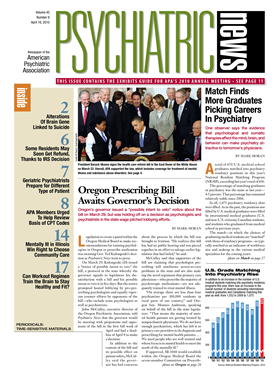A new committee for residents will soon be formed following approval of its establishment by the APA Board of Trustees at its March 13-14 meeting in Arlington, Va.
The new group will be called the Corresponding Committee of Members-in-Training and is charged with relaying information between members-in-training and the Board of Trustees and with increasing the extent of collaboration between member-in-training (MIT) leaders at APA and other components of the Association.
The committee's membership will consist of the Board's MIT trustee and MIT trustee-elect as well as the Assembly Committee of Member-in-Training Representatives from each of APA's seven Areas. Other members will be the Residency Review Committee's MIT liaison, the MIT liaison to the AMA, and one MIT representative from each APA council. In addition, one Board of Trustees member will be selected to serve as a mentor to the new committee, which will report to the Board at least once a year.
On a recommendation from Psychiatric News Editor in Chief James Krajeski, M.D., the Board voted to have APA President Alan Schatzberg, M.D., appoint a work group to help shape the future direction of Psychiatric News and define its role in APA's overall communications strategy. Krajeski noted the need in particular to explore more electronic options, including Web-based and social-media networks, for publishing the newspaper's content.
Krajeski also announced that he was stepping down as editor in chief of Psychiatric News at the end of the annual meeting in May after 12 years at that post. The Board offered the position of editor to former APA president Carolyn Robinowitz, M.D., who will serve in that post for up to one year.
Some tentative changes to the APA election process were also approved. The Board agreed to shorten the period between announcement of candidates and the end of the voting period by two months, with the proviso that realistic timeframes for petition candidates are included. Nominations would be announced in November instead of September. In addition, the Board approved a motion to postpone for one year a move to an all-electronic voting system, thus allowing members without an e-mail address to receive a paper ballot for next year's election; those with an e-mail address would only receive an electronic ballot. Eliminating paper ballots would provide APA with a substantial financial saving.
The Trustees also passed the following resolution relating to the efforts of the APA staff: “The Board of Trustees recognizes and appreciates the dedication and commitment of APA staff to the mission of [APA], especially during times of fiscal constraint and downsizing, and particularly during the recent weather emergency, when staff worked under highly stressful conditions to ensure that APA priorities and programs were completed on time, and with high quality. The Board therefore requests that the Medical Director convey our appreciation and respect to the staff for their outstanding efforts and devotion to our goals.”
On the matter of how to incorporate a minority/underrepresented group (M/UR) member into the Board of Trustees, it voted to form a work group of Board and Assembly members who will write a report for the Board that reviews M/UR participation and representation on the Board, including consideration of “a nationally elected voting M/UR position or any other models for a voting Board of Trustees position.”
In addition, during his report to the Board, APA Medical Director James H. Scully Jr., M.D., announced that while he expected the Association to end 2009 with a budget deficit, a turnaround in the last two months of the year, including a major reduction in the budget for staff salaries and an upturn in publishing revenue, left APA about $1.4 million in the black.
Scully also noted that APA has received a $442,000 grant from the national Library of Medicine to enhance development of clinical practice guidelines for treating major depression using informatics resources. This project will enhance APA's ability to update practice guidelines more efficiently.
Scully announced as well that the television series “Healthy Minds,” produced by New York public television station WLIW and shown nationwide, has been nominated for New York–area Emmy Awards for two of its episodes—“Autism” and “PTSD: Helping Our Troops.” The show is hosted by psychiatrist Jeffrey Borenstein, M.D. The awards will be presented on April 18.

